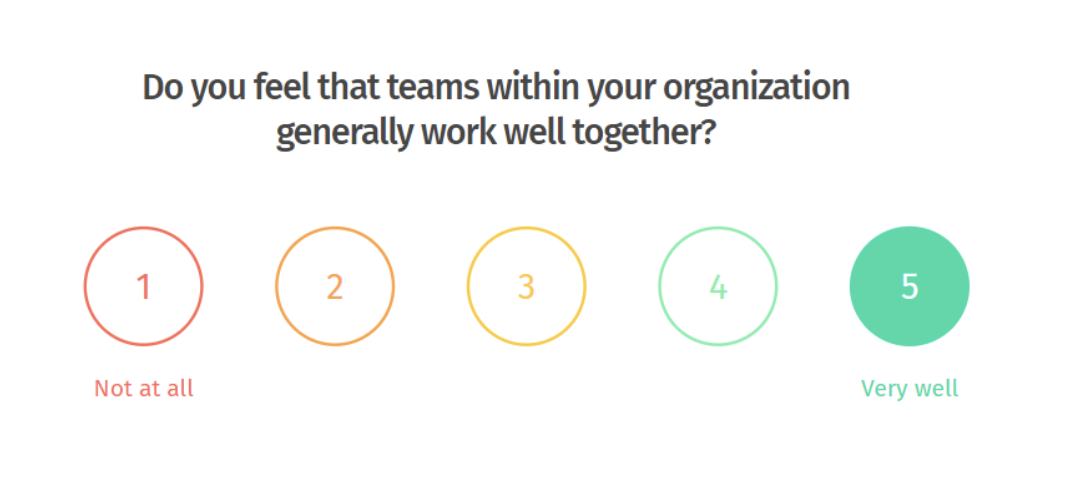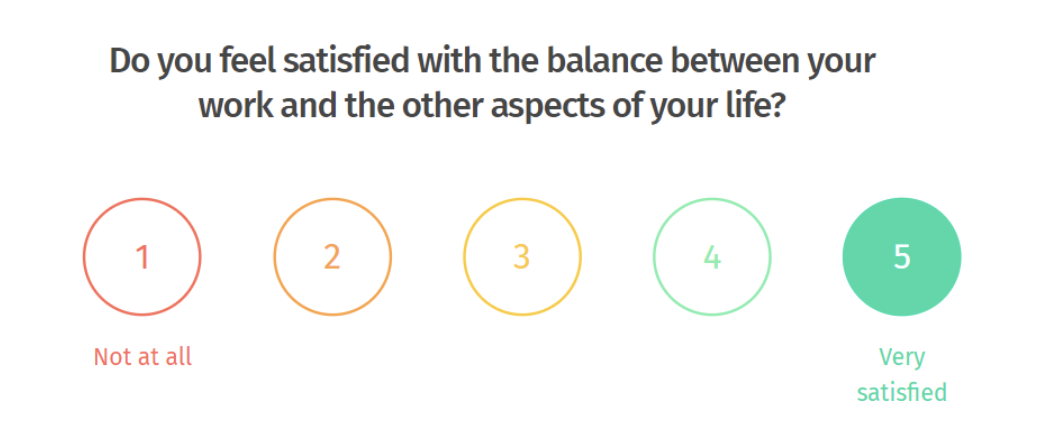Designing employee happiness survey questions that capture employees’ attention and foster honesty and constructive feedback is crucial when conducting a survey.
We’ve listed the top 17 employee satisfaction survey questions to include in your next employee survey to increase employee engagement.
Importance of employee happiness surveys
There are many reasons why conducting employee happiness surveys is so important.
Quickly gather important information
Employee surveys are among the best ways to gather information effectively about employee well-being and engagement in the workplace.
Such a method enables an organisation to evaluate the impact that managers have on their staff and the improvements required to foster future collaboration.
Provides the opportunity for employees to speak
To drive meaningful and positive changes within the organisation, it's important for employees to have a platform to express their opinions and thoughts.
Plus, since employee surveys can be completed anonymously, it allows employees to provide honest feedback without fear of negative consequences.
So, by seeking the opinions of your staff, not only do you get valuable insights, but you also hold the power to influence their behaviour, which can be done through asking relevant and engaging questions.
How to conduct employee happiness surveys
See the below steps for conducting your employee happiness surveys:
- Determine the purpose of the survey: The first step is to clearly define the purpose and objectives of your happiness survey and what you wish to achieve.
- Choose a survey tool: There are different solutions available for conducting employee happiness surveys, some of which are Friday Pulse, Reklektive and Eletive. Choose the tool that best fits your expectations and budget.
- Develop the survey questions: Since you’ve already defined the purpose, write concise questions that are relevant to the purpose of your survey.
- Distribute the survey and gather data: Send the survey out to your target audience and make sure you give employees clear instructions on how to complete the survey.
- Analyse the data gathered: Analysing employee happiness survey results is vital as it gives insights into the overall satisfaction and engagement of your employees. This information can be used to pinpoint areas of improvement, address employee concerns, and foster a positive workplace culture.
- Act upon the results: Lastly, it's crucial that the management team considers the results of the survey and develops an action plan. Because the effectiveness of future employee satisfaction surveys will depend on how effectively the management communicates to employees that their feedback has been heard.
Employee happiness survey questions
We’ve listed 17 employee happiness survey questions below and put them into 4 categories:
- Team happiness questions
- Job satisfaction and engagement questions
- Work environment questions
- Employee recognition questions
Team happiness questions
1. How well do you get along with people on your team?
You will always have interactions with other people at work. Therefore, asking employees about their relationships with their team members and gauging their ability to get along with their colleagues is important.
Strong relationships between team members can lead to better communication and collaboration, which can ultimately improve job satisfaction and productivity.
2. Do you feel that teams within your organisation generally work well together?
This question aims to uncover areas for improvement in terms of team dynamics and build a healthier working environment. With those questions, managers can address any issues that may negatively impact the team’s overall performance.
When team dynamics are not working, it can result in low employee morale, decreased productivity, and even conflict among team members.

3. Are team meetings productive and beneficial for you?
One of the biggest mistakes you can make as a people manager is to host boring and ineffective meetings that fail to interest your team members. And if your employees don’t feel that meetings are productive, it may indicate a need for improvements in meeting planning and execution.
4. Does your team inspire you to do your best work?
Inspiration goes a long way when it comes to teamwork. It can help to create a spirit of collaboration and foster a working environment where team members are motivated to perform at their best. You not only end up having a happier team but also get greater results when you bring out the best in other people.
Job satisfaction and engagement questions
5. Do you feel satisfied with the balance between your work and other aspects of your life?
Asking employees about their satisfaction with work-life balance helps the organisation understand whether their employees feel they have sufficient time for their personal and family responsibilities. In short, maintaining a positive work-life balance benefits employees' performance and productivity in addition to their health and interpersonal connections

6. Do you feel that you are learning new things at work?
Asking employees about opportunities for learning and professional development at work is important as it helps the organisation understand if their employees feel that their skills and knowledge are being utilised and advanced. A workplace that provides opportunities for learning and growth can improve employee engagement and satisfaction.
7. How often do you feel challenged in your role?
You wouldn’t want your employees to feel bored, work at a minimal pace, and spend their workdays without enjoyment or satisfaction. A sense of challenge and purpose is important for employee motivation and can lead to higher job performance.
To keep your staff motivated and active in their job, make sure they are involved in a sufficient number of challenging projects.
8. Do you feel that you are treated with fairness and respect at work?
Asking employees about the fairness, transparency, and respect they receive at work is important as it helps to assess the workplace culture and ensure employees feel valued and are treated fairly. This also includes creating a work environment free from harassment and promoting diversity, equity, and inclusiveness.
9. Do you feel proud to work for your organisation?
A strong sense of pride in one's organisation can lead to improved job satisfaction and enhanced performance. Pride is more than just a feel-good thing—it’s deeply personal and acts as a currency in relationships.

Work environment questions
10. Are you given opportunities to take on new responsibilities and projects?
One of the leading causes of employees leaving their jobs is the unavailability of career growth and development opportunities. When employees have opportunities for growth, they tend to feel happier and more motivated. And happy employees stick around longer. Plus, they feel a sense of ownership in their work and have a greater sense of purpose when they’re able to develop new skills.
11. Do you feel you can influence important decisions in your work?
This question assesses the employee's level of empowerment and participation in the decision-making process. Employees who feel they can make a difference at work are more likely to be content with their jobs. Higher levels of innovation and productivity are accompanied by employee voice, in addition to the benefits of enhanced organisational practices.

12. Are you happy with the level of flexibility in your work schedule?
Employees place a high value on flexibility in the workplace as it provides them with the ability to adapt their work schedule to their individual needs and preferences. Flexibility in the work schedule not only enhances work-life balance, but also gives employees the freedom to attend to personal growth, pursue additional interests, or take time off when needed.
13. To what extent do you feel the company culture aligns with your personal values and beliefs?
The DNA of an organisation is its culture. When employees struggle to fit in, they are more likely to either get disengaged or quit. But, employees who adjust effectively will contribute more, form stronger bonds with their coworkers, and stay longer with the company. Employees are really concerned about the workplace culture and company values. So, creating a positive workplace culture not only makes employees happier but also gives you an advantage when competing with other organisations for top talent.
Employee recognition questions
14. How satisfied are you with the overall leadership style of your manager?
This question is crucial since it enables the employer to understand how the staff views their supervisor and the effects of their leadership style on the workplace. A manager with a supportive and upbeat management style may promote a trusting workplace culture and open lines of communication between the manager and the employees.
15. Does your manager communicate expectations and goals effectively?
Employees are better equipped to prioritise their work and feel secure in their abilities when they know what is expected of them. In contrast, poor communication can cause uncertainty, annoyance, and a loss of motivation. For employees to succeed and feel satisfied in their jobs, expectations must be communicated clearly.
16. How often do you receive helpful feedback on your performance?
A crucial component of staff growth and workplace happiness is performance feedback. Employees who receive feedback on a regular basis can better understand their strengths and weaknesses and receive suggestions for further development. On the other hand, not receiving feedback might make employees feel unappreciated and overlooked.

17. Do you feel adequately compensated based on your responsibilities and experience?
Compensation and benefits are important aspects of an employee’s satisfaction at a workplace, as they directly impact an employee’s performance and motivation to work.
When employees feel that they are being fairly compensated based on their responsibilities and experience, they are more likely to feel valued and motivated in their work. It is imperative that people managers ensure the compensation and benefits offered to their employees are attractive enough to keep morale high.
Tips for conducting employee happiness surveys
Tip 1: Make it convenient
Make the survey easy and convenient so employees are able to participate. When employees have a positive experience participating in the survey, they are more likely to provide honest and valuable feedback. This can help to improve employee satisfaction and engagement and inform decisions that positively impact the workplace.
Tip 2: Keep the survey short and to the point
Employees are more likely to complete shorter surveys because they take less time and effort. Long employee engagement survey questions, however, might make people tired and less attentive to details, which produces results that are less reliable. Keeping the job satisfaction survey short and to the point minimises the intrusion on employees' time, making it a more positive experience for them.
Tip 3: Use employee engagement solutions for better results
Online surveys and employee engagement solutions can make it easy for employees to participate and for the company to assess the survey results. For example, solutions like Friday Pulse allows for convenient, anonymous, and efficient data collection from employees across different departments, providing more holistic and representative insights.
Tip 4: Make the survey a regular occurrence
The frequency of employee engagement surveys depends on the organisation's goals and needs. Some companies conduct them once a year, while others do them quarterly. In any case, make the survey a regular occurrence while striking a balance between collecting enough data to track progress and not overwhelming employees with too many surveys.
Getting started with Friday Pulse
Employee happiness surveys can be a valuable tool for measuring and improving employee engagement. But, their success depends on several factors, including the quality and relevance of the questions asked.
Surveys that are poorly designed—with questions that aren’t relevant to the employees or are too lengthy—may not accurately reflect the employees' experiences and opinions and can result in low response rates.
Friday Pulse is a happiness-measuring and employee engagement platform that helps organisations improve employee happiness levels and experience of organisational culture.
Friday Pulse survey questions allow HR professionals to get measurable improvements in key areas, such as staff retention, productivity, creativity, engagement, and collaboration between teams.
Book a demo of Friday Pulse today and see how it can help create employee happiness surveys that boost engagement and enhance your organisational culture.







